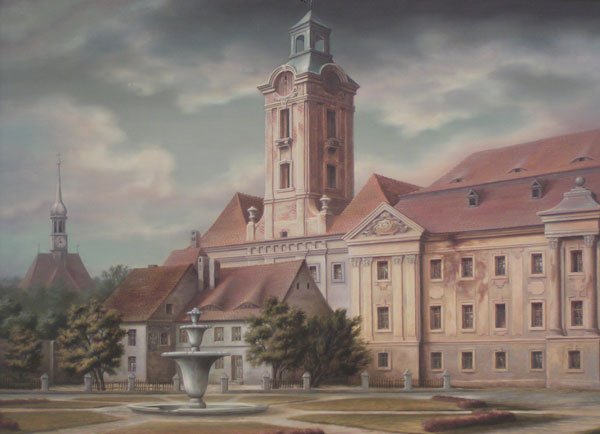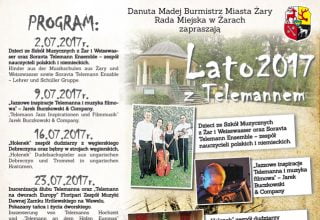Georg Philipp Telemann (1681-1767) had been supposed to become a preacher, than a lawyer and, to the content of music lovers, he became a famous and valued composer. His output influenced significantly the German music of the late baroque and indicated its new direction of development. Telemann’s name is today listed among such 18th century German and Italian musicians as Johann Sebastian Bach, Georg Friedrich Händel, Antonio Vivaldi. Telemann was mainly concerned with composing court and church pieces. He was also a conductor, a singer, a teacher and a theoretician of music. There is quite detailed information about his life and the development of his career since the composer willingly wrote not only notes. He is the author of numerous poetic texts written especially for his compositions as well as three autobiographies from years 1718, 1729 and 1740.
He was an ‘infant prodigy’. At the age of 12 he composed his first opera called ‘Sigismundus’. He learnt to play various musical instruments by himself. In his early childhood he was able to play the violin and the flute without knowing the notes, and at the end of his life there was no instrument he would not know and play. The teacher of singing and harpsichord did not have too much work with young Georg. His education in this area lasted mere two weeks. In his autobiography from 1740 he wrote: ‘I learned to play the harpsichord, however, to my bad luck, I came across one organist who scared me with the German tablature. He played it so stiffly like perhaps his grandfather from whom he inherited the tablature did. In my head more lively melodies from the ones I heard here were already starting to appear. And so I forsook him after 14 days of torment. From then on nobody ever taught me music any more.’ And in one of his letters he added: ‘These two things [singing and playing the harpsichord are all that I learned about music from education, the rest came later from the nature. (…) God and nature gave me real fondness for music. (…) Music, which I value as the main happiness of my life.’

Telemann’s mother, at the beginning from the fear that by composing music her son will not be able to make a living, forbade him to carry on and in 1701 she sent him to Leipzig to study law. Graduating from that faculty was supposed to provide for him in the future. However, it is impossible to change the destiny and exploring the secrets of law lasted only for a year. ‘My instruments were taken away from me, and with them half of my life, and I was strictly forbidden from writing even a single note (…) I spent many nights, because I was not allowed to do that during the day, and many hours in an isolated place with pen in my hand and with borrowed instruments.’
The music he created gained popularity during his life and to this day it may be heard not only in concert halls, but it is also daily played from CDs at our homes. In Poland contests and festivals of his name are held. For example, in 2008 in Poznań the G. P. Telemann International Violin Contest was organized for the fifth time, and the Philharmonic in Zielona Góra organized the 15th International Organ Festival of his name. However, it is not necessary to leave Żary in order to hear live sounds written by Telemann 300 years ago. In December 2007, the G. P. Telemann State Music School of the first grade organized the 6th Telemann Festival in which not only students of music schools from Poland and Germany took part, but also special guests whose names gained recognition in music circles. The music school in Żary is the first place in Poland and the second in Europe (after the Conservatory in Magdeburg) which chose this outstanding composer as its patron. The decision was taken in 2000, and the choice commemorates Telemann’s stay at the Promnitzes’ court in the years 1704-1708.
Telemann came to Żary from Leipzig where he worked as an organist and the music director in the Naukirche church (at present Saint Matthew Church). His innovatory attitude towards church music was not well received by traditionalists who lived there. Because of that conflict, he accepted with great content the post of the conductor in the castle of count Erdmann II von Promnitz in Żary in Lower Lusatia [Dolne Łużyce]. It was the first court in his career at which he was supposed to conduct a band. He took the post over from Wolfgang Caspar Printz (1641-1717) who had been the band director for many years. At the beginning, he stayed in the ‘Hotel de Pologne’ which does not exist at present (in the vicinity of Inwalidów Square), and then, most probably, he moved to a house situated to the south from the town center, outside the town walls. Although he more willingly wrote church music than court instrumental pieces, he was aware that it was a good source of new inspirations and a well-paid job. ‘If there is something in the world which encourages the human spirit to become more and more efficient at what it learned, then it must be the court. We are trying to gain graciousness of its magnificence, courtesy of noble people who live there (…) and we do not refuse efforts to gain our goal (…) Since at the best bloom of my years I arrived at this court, it is easy to notice that I am not going to sit back with my arms folded in order to build my own happiness (…) Orders from various people of high homes and requests from townspeople constantly gave me a reason for creating whole instrumental masterpieces of all kinds.’













